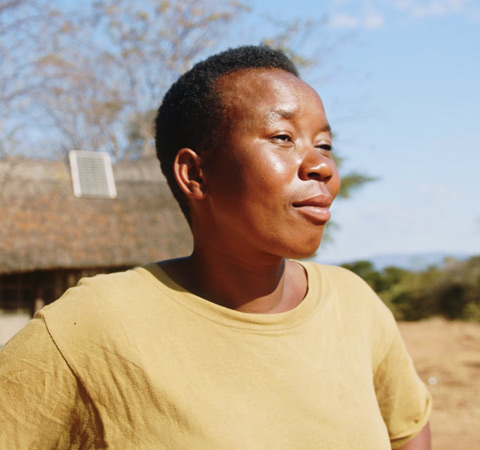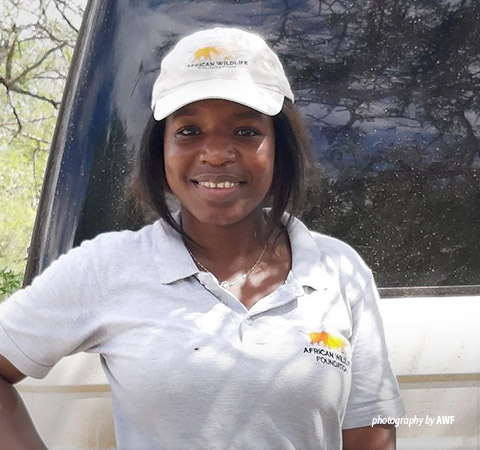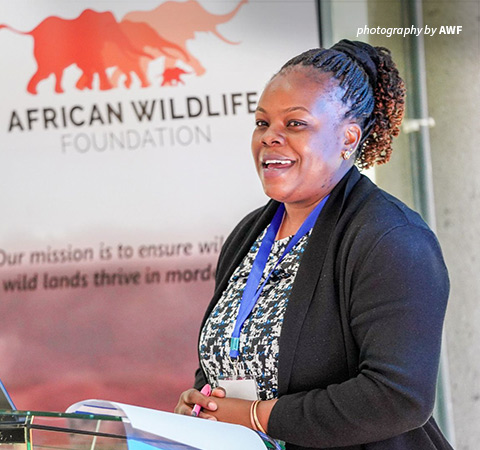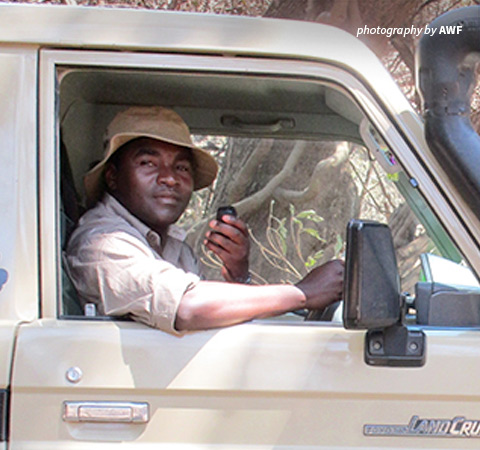Building a united force for wildlife conservation on World Ranger Day

Ranger, wildlife scout, or game warden — their essential and multifaceted roles at the front line help to conserve wildlife, natural habitats, and ecosystems across the world. In honor of World Ranger Day, we explore the diverse work of wildlife rangers and scouts in Zimbabwe, and celebrate their counterparts in Kenya: two African Wildlife Foundation staff members recently appointed as Honorary Wardens by the national wildlife authority.
Edith John, Community Wildlife Scout, Zimbabwe
Edith John is one of the first women to ever serve as a community wildlife scout in her district in northern Zimbabwe. Following in her late father’s footsteps, she joined the ranks after an AWF-supported recruitment drive for women community wildlife scouts in Mbire district.

Edith John is a community wildlife scout in northern Zimbabwe's Mbire district
For Edith, the wildlife scout position was not merely a source of income but a means to give back to the communities sharing space with wildlife in the transboundary Mid-Zambezi landscape — in spite of the risks.
Human-wildlife conflict is prevalent and illegal wildlife trafficking is common along the Zambia-Zimbabwe border on the Zambezi river. Edith’s father succumbed to a lion attack in the line of duty, but she knows the risks of her job are worthy. As depicted in ‘The Peacekeepers,’ Edith sympathizes with families whose fields are destroyed in the dead of the night by wandering elephants. “As a woman who has to provide for her children, I really feel it when reports of crop losses are made,” she says in the film.
Edith notes initial reluctance among some community members to accept women in the role of wildlife protector. But now, she says, “They really appreciate what I do as a woman. They express joy and want to be part of what we do.”
Her fellow wildlife scouts in Mbire district share the same optimism. In honor of World Ranger Day last year, they shared their experiences with AWF Zimbabwe Country Director Olivia Mufute, who spearheaded the recruitment of women wildlife scouts. “In the next five years, I would like to take on senior responsibilities and also lead other female scouts who will join our team,” said Shylet Mugonapanja.
Mary Wanyika, Kenya Wildlife Service Honorary Warden
In May 2021, Kenya Wildlife Service appointed AWF’s Community Development Officer Mary Wangio Wanyika as an Honorary Warden for the Southern Conservation Area. She will hold the position for the next three years and continue to contribute to the wildlife authority’s community conservation efforts in the Tsavo landscape.
Born and raised in Tsavo, Wanyika experienced the challenges that communities face across the wildlife-rich, transboundary landscape. “It really motivated me to work in this field,” she says.

AWF Community Development Officer and Kenya Wildlife Service Honorary Warden Mary Wanyika
Wanyika engages local youth groups, ranches, and small-scale farmers to embrace a conservation mindset built on local development. She works closely with Kenya Wildlife Service teams to create community awareness and strengthen human-wildlife conflict mitigation measures, some of which double as livelihood programs.
She recounts an important meeting with Kenya Wildlife Service Assistant Director Robert Njue, overseeing the Tsavo Conservation Area at the time. He appreciated how Wanyika had contributed to the community and her broader vision for her people but he challenged: “Do you think you can do more?”
Her answer was a resounding yes and applying for the service’s Honorary Warden program came to mind. “And I got it!” Wanyika smiles. “I love the branding that comes with it — a local, a youth, and a woman.” It sends a clear message that young women can take up leading roles in community development and conservation. “It’s doable, it’s workable,” she adds, noting that bringing about behavior change is easier when one is speaking to their own.
As an Honorary Warden, Wanyika becomes an ambassador for the Kenya Wildlife Service among communities in the Tsavo landscape. Importantly, her appointment underscores the shared mission of AWF and the wildlife management authority to nurture community buy-in for conservation. Efforts to curb illegal trade are in place, but gaps in community understanding of wildlife law persist, particularly among the youth. “Embracing conservation-friendly, alternative livelihoods is now a priority,” she says.
Didi Wamukoya, Kenya Wildlife Service Honorary Warden
Didi Wamukoya leads AWF’s counter wildlife trafficking program. In May 2021, she began a three-year appointment as a Kenya Wildlife Service Honorary Warden for the Southern Conservation Area.

Didi Wamukoya leads AWF's Counter Wildlife Trafficking team and is a recently appointed Kenya Wildlife Service Honorary Warden
Before joining AWF in 2015, Wamukoya — an Advocate of the High Court of Kenya — served as the Head of Prosecution at Kenya Wildlife Service. Initially deployed as a wildlife crime investigator, she established the wildlife agency’s prosecution unit to ensure that the law takes its course.
Since joining AWF, Wamukoya has continued to work with wildlife agencies across the continent to streamline cross-border wildlife law enforcement, providing on-the-job training and mentorship opportunities for prosecutors and judicial officers dealing with wildlife cases. At the same time, Wamukoya’s team supports investigators and intelligence officers by expanding their capacity to handle wildlife cybercrime cases. Additionally, AWF-supported wildlife detection canine handlers are trained on evidence management to ensure that illegal wildlife products intercepted by these teams can be presented in court.
“Wildlife law enforcement is very broad,” explains Wamukoya. Rangers are wildlife law enforcers, but their work extends beyond security patrols and apprehending poachers. “They have to ensure that humans and wildlife are coexisting. They talk to communities, students, even children, to inform them about the importance of conservation, and also about wildlife law and wildlife crime,” she says.
As a an Honorary Warden, Wamukoya will continue supporting prosecutorial and law enforcement capacity for Kenya Wildlife Service rangers. “AWF’s counter wildlife trafficking priorities in Kenya directly provide resources, expertise, and equipment for Kenya Wildlife Service investigation, prosecution and field ranger teams, as well as canine detection units,” she explains. “Over the next three years, I will expand counter wildlife trafficking support not only in the Southern Conservation Area where I am appointed but in Kenya at large,” she says.
Simon Muchatibaya, former Senior Ranger, Zimparks
Simon Muchatibaya, AWF's Technical Advisor in Zimbabwe’s Mana Pools National Park, was a Senior Ranger working with Zimbabwe Parks and Wildlife Management Authority before joining AWF. In honor of World Ranger Day 2020, Muchatibaya shared his experiences in a webinar with other wildlife protectors.

AWF Technical Advisor Simon Muchatibaya started his career in wildlife conservation as a Zimparks scout
“As a child, I felt I was drawn to nature and fell deeply in love with wildlife, and at a young age, I found myself joining Zimparks as a scout,” says Muchatibaya. He stayed at the wildlife management authority for 17 years and now oversees anti-poaching and security efforts in Mana Pools National Park. His work involves engagement with Zimparks at all levels — from rangers on the ground to area managers, the regional manager, and other staff at the Harare headquarters.
He has earned an impressive array of local and international awards for his contributions to conservation, including two Gold Presidential Merit Awards for outstanding anti-poaching operations and initiatives in Zimbabwe.
He acknowledges the difficulties of the job: physical danger, lack of resources, emotional and cultural difficulties linked to being away from loved ones for long periods and often looked down upon by those who consider their work to be of low value due to its dangers and hard conditions.
Muchatibaya envisions a world where everyone, including children and women, are totally involved in wildlife and wild lands conservation and benefit equitably from natural resources. “We conserve for our children, we conserve for the future generations. It is a duty of every one of us today to conserve. We are enjoying what we have today because other people conserved the resources for us. Let us not be the ones who lose the battle.”